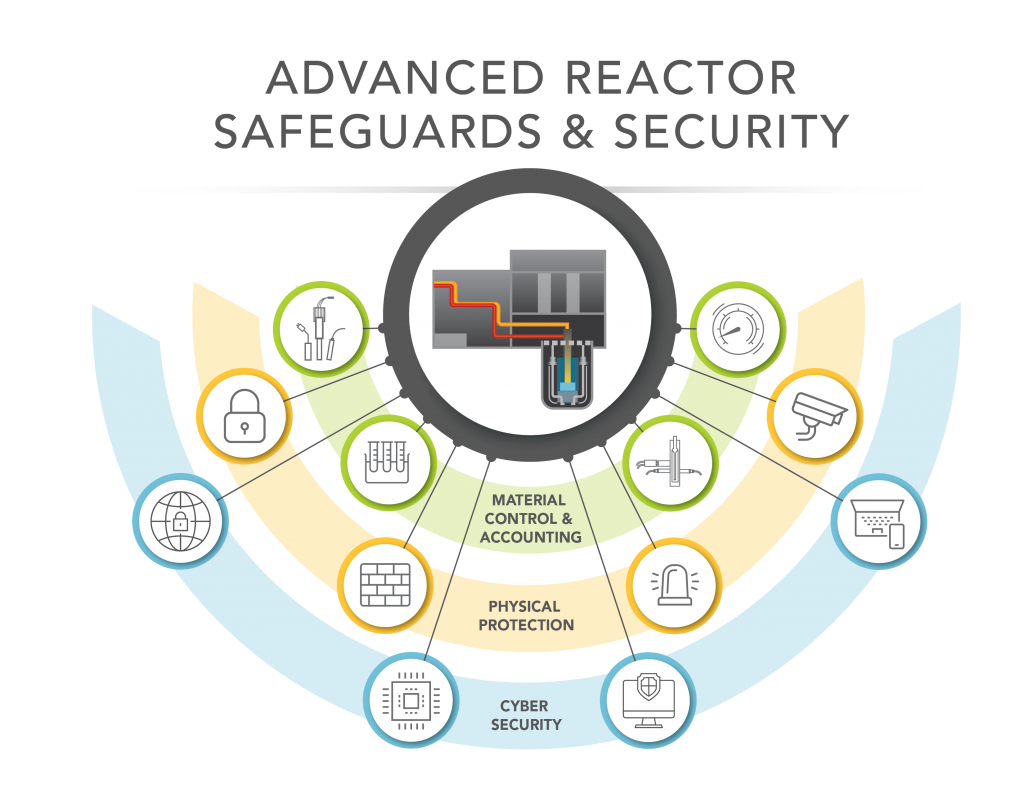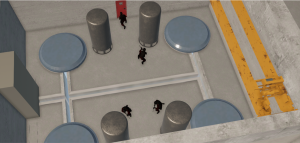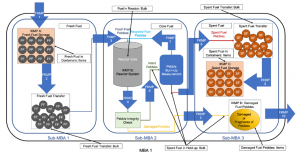The Advanced Reactor Safeguards and Security (ARSS) program area in the Department of Energy, Nuclear Energy (DOE NE) seeks to support domestic deployment of advanced nuclear reactors by mitigating safeguards and security roadblocks. The program applies laboratory research and development to address near-term challenges advanced reactor vendors face in meeting Physical Protection System (PPS), Material Control and Accounting (MC&A), and Cybersecurity requirements for U.S. construction.

Key Thrust Areas
Develop Robust and Cost-Appropriate Physical Protection Systems

Security costs for nuclear reactors can be prohibitive. The ARSS program is examining alternative PPS approaches that may drastically reduce the expenses associated with security. New technologies for detection, delay, and response are being actively developed and tested. These can be used alongside the security-by-design principles to optimize a PPS. The interface between security and safety plays an important role in advanced reactors and may allow for a more efficient PPS. The ARSS program is also supporting deployment of university research reactors and MC&A or PPS requirements.
- Small Modular Reactor and Microreactor Security-by-Design Lessons Learned
- U.S. Domestic Molten Salt Reactor Security-by-Design
- Advanced Delay Technologies
- Overview of University Advanced reactor Deployment Activities
- New Security Concepts for Advanced Reactors
- Deliberate Motion Analytics
- U.S. Domestic Microreactor Security-by-Design
- U.S. Domestic Pebble Bed Reactor: Security-by-Design
- U.S. Domestic Small Modular Reactor Security by Design
Evaluate Material Control and Accounting Approaches for Pebble Bed Reactors
Some advanced reactor designs utilize alternative fuel forms, such as pebble-based fuel. Pebble Bed Reactors (PBRs) present a unique MC&A challenge in that tracking and counting the vast number of pebbles may be difficult for existing technologies and approaches. The ARSS program is examining each aspect of the PBR design from a safeguards perspective, including the MC&A approach, pebble handling systems, burnup measurements, and the interface between physical protection and MC&A.
- Uncertainty Quantification for the Discharge Burnup and Isotopic Inventory for PBRs
- Imaging Techniques for Pebble Accountancy
- Gamma Spectroscopy Performance for Irradiated Solid-Form TRISO Fuel
- Machine Learning to Improve Burnup Measurement in Pebble Bed Reactors – FY24
- Nuclear Material Control & Accounting for Pebble Bed Reactors – FY23 Summary Report
- Use Machine Learning to Improve Burnup Measurement in Pebble Bed Reactors – FY23
- NDA of TRISO Fuels – FY23
- Nuclear Material Control and Accountancy Approach for Pebble Fueled Reactors using a Novel Pebble-Type Identification and Classification Technology
- Pebble Bed Reactor Domestic Safeguards – FY21 Summary Report
Evaluate Material Control and Accounting Approaches for Molten Salt Reactors
Liquid-fueled molten salt reactors (MSRs) are singularly unique advanced reactor designs in that the fuel itself is in bulk form, as opposed to being discrete items (such as pebbles or fuel assemblies). The ARSS program is examining an overall MC&A approach, as well as exploring new measurement technologies and statistical methods to meet regulatory requirements.
- Material Control and Accounting for Liquid-Fueled Molten Salt reactors – Material Control and Holdup
- Optical Techniques for Advanced Salt Systems
- Assessment of Flow-Enhanced Electrochemical Sensor Testing and Deployments
- Planning for Material Control and Accounting at Liquid-Fuel Molten Salt Reactors
- Assessment of Flow Enhanced Electrochemical Sensor Testing and Deployments for Molten Salt Reactors
- Testing Application of Optical Techniques to Advanced Salt Systems
- Material Accountancy for Molten Salt Reactors Challenges and Opportunities
- Experimental Validation of Nondestructive Assay Capabilities for Molten Salt Reactor Safeguards – FY21 Report
- On-line Monitoring for Molten Salt Reactor MC&A: Optical Spectroscopy-Based Approaches
- MC&A for MSRs: FY2021 Report
Cybersecurity
The ARSS program sponsors cross-cutting R&D to enable the use of advanced digital technologies for advanced reactors and current U.S. nuclear fleet. This program aims to adapt the best cybersecurity discoveries and practices from other sectors to the rigorous needs of nuclear power applications and to address any unique challenges not being addressed elsewhere, especially where these can enable innovative nuclear power use cases.
- Design of Defensive Cybersecurity Architectures for High Temperature Gas-Cooled Reactors
- Security-Inclusive Model-Based System Engineering Demonstration Using MARVEL Reactor
- Cybersecurity Consequence Prioritized Design via Simulation
- Field Programmable Gate Array-Based Reactor Protection Systems and Potential for Inclusion of Security Elements to Improve Cybersecurity
- Integrity Enhancing Protocols – Performance and recommendations for Nuclear Systems
- Top Event Prevention Analysis Using a Concept of Margin
- Test Platform Survey and Wireless Test Requirements Outline
- System-Level Design Analysis for Advanced Reactor Cybersecurity
- Cyber-Physical Risks for Advanced Reactors
- Towards a New Supply Chain Cybersecurity Risk Analysis Technique
- Remote Operations and Monitoring: Attack Surfaces
Consider International Safeguards and Security Requirements

Many advanced reactor vendors also consider international safeguards and security when designing their facility, in anticipation of international deployment. While focused on domestic safeguards, the ARSS program partners with NNSA to support vendors with global aspirations.
- Advanced Reactor Safeguards: Lessons from the IAEA Safeguards Domain
- The Nexus site provides resources for international safeguards and security support for advanced reactors.
Validation of ARSS Research through Vendor Engagements

The ARSS program provides direct support to vendors to assist in developing MC&A, PPS, and cybersecurity approaches for their facilities. This work examines design-specific challenges associated with advanced reactors and generates creative solutions early in the development phase. Some engagements are in partnership with the National Nuclear Security Administration (NNSA) through the NEXUS portal. Lessons learned from this work are available to all vendors, to promote knowledge-sharing in a growing industry.
Spring 2024 ARSS Program Review Presentations
Day 1
- University Advanced Reactor Activity Assessment
- Risk-Informed Consequence-Driven Physical Protection System Optimization for Microreactor Sites
- Cyber Integration, Remote and Autonomous Operations
- MC&A for Pebble Bed Reactors
- Uncertainty Quantification of Pebble’s Discharge Burnup and Isotopic Inventory: Correlation Matrix
- DCSA for HTGRs
- Using Machine Learning to Improve Efficiency and Accuracy of Burnup Measurements at PBR Reactors
- TRISO NDA Measurements for Burnup
- Pebble Database for PBR MC&A-NEUP
- Security-by-Design for Microreactors
- Advanced Sensor Fusion Using Low-Cost Sensors for Dramatic Physical Security Cost Reduction
Day 2
- Data-driven optimization of PPS
- Security-Inclusive MBSE Tools for Nuclear Reactor Development
- ARCADE: Advanced Reactor Cyber Analysis and Development Environment
- Allocating Performance Margin Using Mult Attribute Top Event Prevention Analysis
- Secure Elements
- Integrity Enhancing Protocols
- Advanced Reactor Wireless Communications
- Managing Emerging Technologies
- Quantum-Based Secure Communications for Remote Operations
- Nuclear Material Control and Holdup Considerations in Circulating Liquid-Fueled MSRs
- Process Monitoring for MC&A: Optical Spectroscopy
- In-Line Flow-Enhanced Electrochemical Sensors for MSR Mass Accountancy
- Security-by-Design for MSRs
- Risk-Informed Consequence-Driven Hybrid Cyber-Physical Protection System Security Optimization for Advanced Reactor Sites
Day 3
- Gen-IV Proliferation Resistance and Physical Protection Working Group Activities
- Safeguards and Security for Maritime Applications
- Materials Protection, Accounting, and Control Technologies FY2023 Overview
- ARISE Program Overview
Contact
Ben Cipiti, National Technical Director
Advanced Reactor Safeguards and Security Program
Sandia National Laboratories
Katya Le Blanc, Deputy National Technical Director
Advanced Reactor Safeguards and Security Program
Idaho National Laboratory
Dan Warner, Federal Program Manager
Advanced Reactor Safeguards and Security Program
Department of Nuclear Energy, Office of Nuclear Energy

